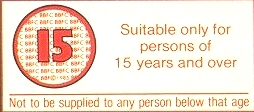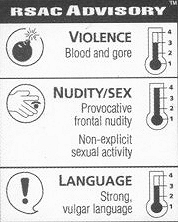
eBriefs
Computer
Games - Interactive Movies - Players
- Stakeholders -
Local
Censorship - Overseas Censorship - Developer
Responses -
Accusations

 How are computer games censored in comparable overseas countries?
How are computer games censored in comparable overseas countries?
Here are some international
comparisons of computer games censorship systems. It is interesting
to note that almost all games that enter Australia - whether approved by
the OFLC or not - already contain one
of more stickers or other form of box marking that indicates the game's
censorship rating overseas. Every single game that has been banned
in Australia has received ratings in the UK and the
USA
at the upper end of the scales referred to in this section. The systems
that are discussed here respect the rights of
adults to play games aimed at their maturity level while providing
plenty of warning regarding the more violent and/or
sexually explicit content for the benefit of those who feel the need
to censor games brought into their homes. These systems are often
much more detailed and informative than anything
devised to deal with computer games in this country.
In the
United Kingdom, computer games are classified by the European
Leisure Software Publishers Association (ELSPA), with most titles rated
15+ or 18+ being submitted to the British Board
of Film Classification for ratings verification. According to
ELSPA, the system is designed to ensure responsible behaviour by members
and to allow parents to make informed choices about the game playing of
their children. More importantly, it goes on to say that it accepts
that there is a legitimate market for computer and video games with mature
themes as long as they are provided to the market in a responsible and
lawful manner. ELSPA has an 18+ rating for computer and video games.
If one looks in almost any British computer games magazine such as PC
Format, one will find advertisements for games banned in Australia
(Phantasmagoria,
Strip
Poker, etc.) with 18+ classifications. In other words, computer
games prohibited from sale in Australia may be freely sold to all interested
adults in the UK.


The European Leisure Software Publishers Association considered
this game to be suitable for adults only, and accordingly gave it an 18+
age rating. Specifically, they indicated that it was unsuitable for
all younger age groups.


In the United Kingdom, ELSPA rating decisions related to ages 15
and up need to be ratified by the British Board of Film Classification.
Such games ratings decisions result in such products being allocated 15+
or 18+ ratings in the same manner as films in that country.
 In the United
States of America, games software is not legally obliged to be classified,
but most developers submit their products
for classification to either the Entertainment
Software Rating Board (ESRB), the Recreational Software Advisory Council
(see below), or both in recent years.
In the United
States of America, games software is not legally obliged to be classified,
but most developers submit their products
for classification to either the Entertainment
Software Rating Board (ESRB), the Recreational Software Advisory Council
(see below), or both in recent years.
Adults are well catered for
in the ESRB scheme, with ratings categories ranging from "Early Childhood"
to "Adults Only". In addition, content descriptors are added so that
consumers may gain some idea of why a title was classified the way it was.
In the higher classifications, simulated sexual and violent content may
exist to a considerably greater degree than is allowed under Australia's
more restrictive games ratings system.
For example, the unmodified
version of Duke Nukem 3D that caused
so much controversy in Australia was rated M 17+ for "Animated Blood and
Gore", "Animated Violence", and "Strong Sexual Content". Phantasmagoria
(banned in Australia) was also rated M 17+, this time for "Realistic Blood
and Gore", and "Strong Sexual Content". Finally, Voyeur
(also banned in Australia) was rated M 17+ for "Mature Sexual Themes" and
"Realistic Violence". Note that M 17+ was also given to games that
are perfectly legal in this country such as Soldier
of Fortune. M 17+ is not even the highest ratings category
used by the ESRB - there is still room for stronger content (always non-violent
and sexual) under the AO (Adults Only) classification.
The ESRB system is supported
in the USA by the vigilant supervision of games software purchases by both
software retailers and parents and thus ensures that minors cannot access
material that may harm or disturb them.


An adult games classification rating by the USA's Entertainment
Software Ratings Board.


Consumer advice linked to an adult games classification rating
made by the ESRB, providing reasons for their decision.
 A highly qualified team of academics,
psychologists, educators, and industry representatives are behind the success
of the Recreational Software Advisory Council (RSAC) games ratings scheme
- an alternative to the ESRB (see Kent, 2000).
Over 400 titles from over 100 publishers have been classified by this organization
so far. Games are assessed according to the levels of violence (V),
nudity/sex (NS), and language (L) they contain - from level 0 through to
4. If the level of any of these categories within a particular game
exceeds 0, then a thermometer icon or icons are included on the box's ratings
sticker with the level of each of the contentious elements present
in the title filled in. As with most classification systems, consumer
advice is added to the numerical rating(s).
A highly qualified team of academics,
psychologists, educators, and industry representatives are behind the success
of the Recreational Software Advisory Council (RSAC) games ratings scheme
- an alternative to the ESRB (see Kent, 2000).
Over 400 titles from over 100 publishers have been classified by this organization
so far. Games are assessed according to the levels of violence (V),
nudity/sex (NS), and language (L) they contain - from level 0 through to
4. If the level of any of these categories within a particular game
exceeds 0, then a thermometer icon or icons are included on the box's ratings
sticker with the level of each of the contentious elements present
in the title filled in. As with most classification systems, consumer
advice is added to the numerical rating(s).
Examples of rated titles
include (all of these were Refused Classification - banned to everyone
- at some point in Australia):
Dream
Web - V4: wanton and gratuitous violence; NS3: frontal nudity,
non-explicit sexual activity; L2: profanity.
Duke
Nukem 3D [Unmodified USA version] - V4: wanton and gratuitous violence;
NS1: revealing attire; L1: mild expletives.
Phantasmagoria
- V3: blood and gore; NS3: partial nudity, non-explicit sexual activity;
L3: strong, vulgar language.
Voyeur
- V3: blood and gore; NS3: non-explicit sexual activity, revealing attire;
L4: crude or explicit sexual references.
As is the case with the ESRB,
the RSAC's idea is not to ban any games, but to classify titles so that
consumers may make an informed choice over their gaming purchases for both
themselves and their families.


Recreational Software Advisory Council ratings and consumer advice
allocated to Phantasmagoria 2.
That particular game scored 3 out of 4 for the intensity of its violence,
4 out of 4 for the intensity of its nudity and sex, and 3 out of 4 for
the intensity of its language.

For further information regarding
the censorship of computer games overseas, please consult MacIsaac,
1996 and Watson and Shuker, 1998.